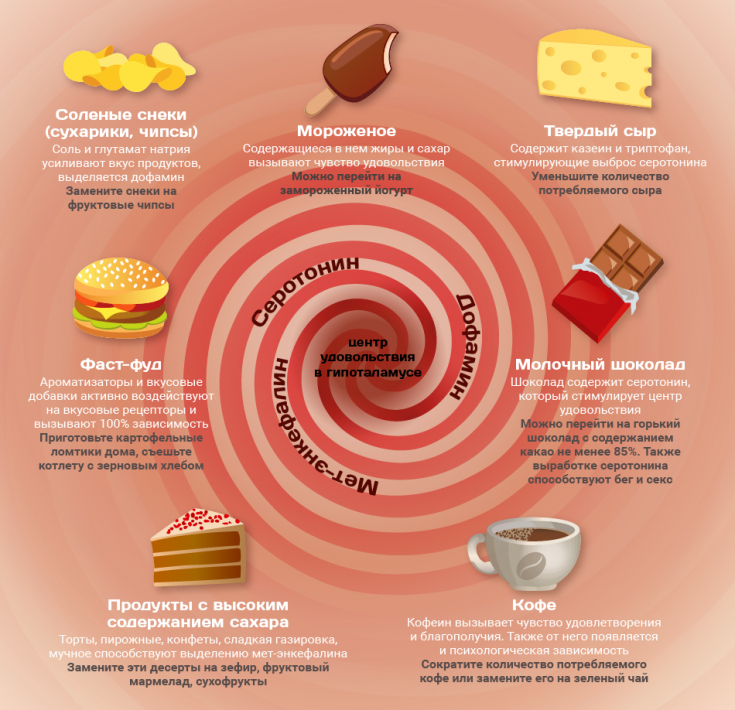We need food to provide the body with energy and the normal course of all biochemical processes. Are you sure that your breakfast, lunch, and dinner match this statement? A lunch? A snack with employees "for company" or that bucket of popcorn, without which the film is not so interesting? In fact, the term "food addiction" sounds more and more often, scientists do not deny that a psychological attachment to food exists. Are you addicted? Find out in this article.
- What is psychological food addiction
- Signs of Food Addiction: Check Yourself
- How to stop "hamstering": 5 easy tips
What is a psychological addiction to food
Why do we want to eat at all? The feeling of hunger occurs when the stomach is empty, and when the physico-chemical parameters of the blood change (glucose levels fall). The food center of the hypothalamus secretes substances that encourage the search for food. As soon as there is food in the stomach, the glucose level rises, a feeling of fullness sets in. And everything would be simple, and food wouldn occupy such a role in human life, if it — happiness hormone dopamine.
Read also: Is it bad to eat — — debunking a popular food myth
In order for a person not just to look for something to chew, but to make an effort to get high-calorie food, the brain "encourages" eating fatty, sugary foods releases dopamine. It is an innate mechanism necessary for the survival of the species. Therefore, it is so difficult to force ourselves to eat healthy, but low-calorie food, we simply do not get pleasure from eating. Also, the hormone of happiness is produced in response to other actions. Any positive experience is reinforced by dopamine "praise", but eat a delicious — the simplest and easy way. Pathway to food addiction.
Read also: How to get rid of hunger: 5 tips for those who want to lose weight
Signs of food addiction: check yourself
Even if you don't sneak to the refrigerator at at at at at speak pass the pastry shop, it doesn means that the eating-for-pleasure habit has not been formed. Here are a few signs that can identify food addiction:
-
Overeating causes guilt, you reproach yourself for not being able to resist.
-
The urge to eat alone, the anxiety of the thought that you might not have enough food at communal table.
-
Enjoy combining your meal with some other activity (reading, watching a movie, talking on the phone).
-
The portions seem small, I want to add more before they started eating.
-
After a full meal, there is a desire to eat something else.
Even if food addiction exists, it can be overcome. No matter how frightening the claims that addiction to "delicious" comparable to alcohol or drug addiction — it's not so. Eating habits can and must be formed and corrected, the main thing is to recognize the need to do this.

Read also: Save the planet: what to eat to reduce environmental damage
How to stop "hamstering": 5 easy tips
In severe cases, food addiction can lead to eating disorders, and it is already a serious life-threatening mental disorder (for example, bulimia nervosa or psychogenic overeating). In this case, the help of doctors is needed, it will not be possible to overcome addiction on your own. Fortunately, this rarely happens, in most cases simple recommendations will help:
-
It takes 3-4 hours to get hungry. Try to maintain these intervals between snacks. The food will seem tastier, and the risk of overeating will be small. And remember: the natural volume of the stomach — 250 grams, don stretch it in large portions.
-
Focus on the nbsp;quantity, but of the presentation of the food. Master the cooking of sushi, try poached eggs instead of the usual scrambled eggs, and it will turn out that the anticipation and preparation is even more pleasant than actually eating.
-
Studies have confirmed that a little physical activity reduces the feeling of hunger. A 15-minute exercise or cardio workout can help take your mind off snacking.
-
Deceive the pleasure receptors by leaving some of the harmful, but favorite foods in your diet. By weight and volume, they should be no more than 10% of the total amount.
-
Dopamine is produced not only when eating, doing what we love also gives us pleasure,especially when we see results. There are so many interesting things in the world besides food — find yourself a hobby, and cakes and chips will be forgotten by themselves.
Whenever the urge to eat arises, ask yourself: is it hunger or pleasure? The best way to test it — imagine a slice of bread. If you desperately want to eat it, most likely you are really hungry, and if your imagination persists in drawing a cake or a steak, this is just a desire for dopamine "encouragement". Adhere to the principle "eat to live, and not" live to eat" and you don feeling addiction.
Read also: What foods make us age
You might be interested in: Abs Workouts.






Add a comment